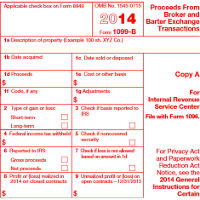

Form 1099-B is an IRS form titled “Proceeds From Broker and Barter Exchange Transactions.” This form is used to report gains or losses from transactions, such as stock purchases and sales, or the purchase or sale of precious metals for example.
Among other things, the form requires detailed information on items, such as:
These forms are distributed by various companies such as brokerages and dealers in accordance with IRS requirements.
Per the IRS website, a broker or barter exchange must file a form 1099-B for each person:
For whom the broker has sold (including short sales) commodities, stocks, foreign currency contracts (pursuant to a forward contract or regulated futures contract), forward contracts, debit instruments, regulated futures contracts, or security futures contracts for cash. There may be other products as well that will necessitate a form 1099-B filing by the broker or barter exchange.
In addition, any person that received cash, property or stock from a corporation that the broker knows or has reason to know has undergone a change in capital structure reportable on form 8806 or has been acquired in an acquisition.
The broker or barter exchange must also file a form 1099-B for any person that has exchanged property or services through a barter exchange.
Some types of transactions will be reported individually on their own forms while other types of transactions will be reported on an aggregate basis. If more than one type of security is involved in a transaction, a separate form 1099-B should be used for each security involved.
According to the IRS website, a broker is any person who facilitates sales made by others in the ordinary course of their business or trade. A broker can be an individual, a foreign person, a government unit or any subsidiary agency. In addition, a corporation that regularly redeems its own shares is considered to be a broker. An obligor that regularly issues and retires its own debt obligations is considered to be a broker, as well.
The government requires bullion dealers to report applicable bullion purchases and sales. Some of the types of sales that bullion dealers are obligated to report are:
Some of the types of purchases that bullion dealers are obligated to report are:
For more information on form 1099-B and how it applies to specific gold and silver bullion sales, be sure to check out our Reportable Bullion Transactions Infographic. Additionally, there is a vast amount of information regarding the 1099-B form available on the IRS website. There are very clear guidelines for the form 1099-B, its uses and when it is required and by whom.
None of the information contained here is intended to be tax advice, but rather a simple guide on what the form 1099-B is. For any questions relating to form 1099-B, its uses or the necessity of, one should always consult their CPA or tax professional.